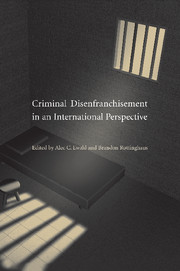Book contents
- Frontmatter
- Contents
- Contributors
- Foreword: Waves of Democracy and Criminal Disenfranchisement
- Acknowledgments
- Introduction
- Part I CONTEMPORARY DISENFRANCHISEMENT LAW
- 1 Voting Rights and Human Rights: A Comparative Analysis of Criminal Disenfranchisement Laws
- 2 Punishment and Social Exclusion: National Differences in Prisoner Disenfranchisement
- Part II DISENFRANCHISEMENT IN COMPARATIVE PERSPECTIVE: LEGAL AND POLITICAL APPROACHES
- Part III VOTING RIGHTS AND PEOPLE WITH CRIMINAL CONVICTIONS: CASE STUDIES
- Index
- References
1 - Voting Rights and Human Rights: A Comparative Analysis of Criminal Disenfranchisement Laws
Published online by Cambridge University Press: 03 July 2009
- Frontmatter
- Contents
- Contributors
- Foreword: Waves of Democracy and Criminal Disenfranchisement
- Acknowledgments
- Introduction
- Part I CONTEMPORARY DISENFRANCHISEMENT LAW
- 1 Voting Rights and Human Rights: A Comparative Analysis of Criminal Disenfranchisement Laws
- 2 Punishment and Social Exclusion: National Differences in Prisoner Disenfranchisement
- Part II DISENFRANCHISEMENT IN COMPARATIVE PERSPECTIVE: LEGAL AND POLITICAL APPROACHES
- Part III VOTING RIGHTS AND PEOPLE WITH CRIMINAL CONVICTIONS: CASE STUDIES
- Index
- References
Summary
INTRODUCTION
This chapter offers an in-depth analysis of the criminal disenfranchisement policies of the world's democracies, with a focus on Europe. Simply describing these laws accurately has proven to be a surprisingly difficult task; a few previous authors have attempted to do so, focusing mostly on documents such as constitutions and election law statutes. This chapter draws on their important work, but constitutions and statutes alone often fail to deliver a full understanding of a given country's disenfranchisement policies and practices. So, in addition to such formal legal sources, this chapter benefits from research into legislative materials, judicial proceedings, advocacy reports, and numerous other sources, including information from original surveys and interviews with governmental and nongovernmental officials of several countries. After this introduction, the second section describes the policies of European nations. The third section offers detailed summaries of recent decisions rendered by various countries' constitutional courts and their governments' compliance with those decisions. The fourth section examines mechanisms used in various democracies to implement prisoner voting. The conclusion of this chapter comments on the efficacy of international comparison arguments in current debates over U.S. disenfranchisement laws, both inside governmental bodies and in the public at large.
The following are among the central findings of this chapter. First, almost half of European countries allow all incarcerated people to vote, whereas others disqualify only a small number of prisoners from the polls; almost all of the European countries that disqualify inmates from voting are in eastern Europe.
- Type
- Chapter
- Information
- Publisher: Cambridge University PressPrint publication year: 2009
References
- 2
- Cited by



